In the competitive world of luxury hospitality, first impressions matter. The hotel lobby is the gateway to the guest experience, and LED display screens are revolutionizing how hotels create memorable, immersive environments. Unlike traditional static signage or overhead projectors, modern LED screens offer ultra-high-definition visuals, interactive capabilities, and seamless integration with smart systems. These displays are not just tools for information—they are central to brand identity, guest engagement, and operational efficiency.
The adoption of LED technology in hotel lobbies has accelerated since 2020, driven by advancements in modular panel design, energy-efficient hardware, and AI-powered content management. Today, leading hotels like The Ritz-Carlton and Four Seasons use LED displays to enhance ambiance, promote services, and deliver real-time updates to guests. This article explores how LED screens are reshaping hospitality while addressing technical considerations and future trends.
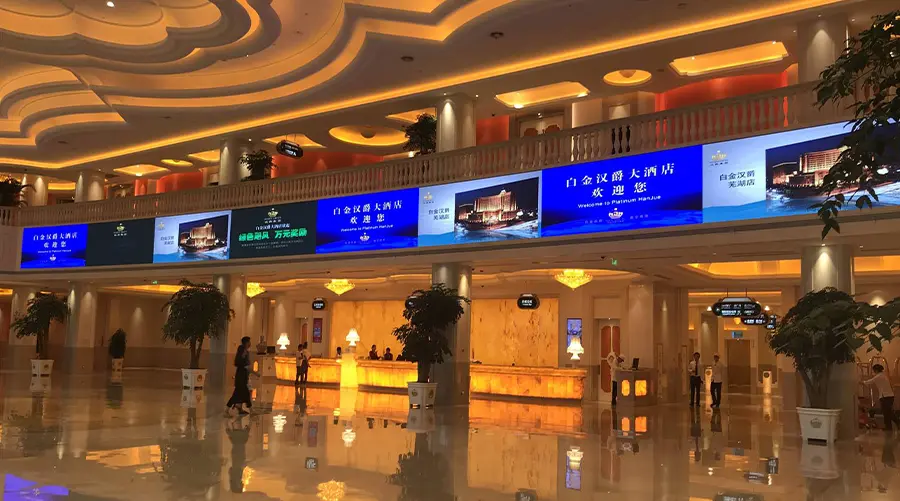
LED display screens offer transformative benefits for hotel lobbies:
Unmatched Visual Quality: 4K/8K resolution and HDR support ensure vibrant colors, deep blacks, and sharp details that captivate guests from the moment they enter.
Dynamic Content Flexibility: Real-time updates for flight information, event schedules, and promotional offers keep guests informed and engaged.
Space Optimization: Ultra-thin, lightweight panels allow for curved, stacked, or transparent designs that blend seamlessly into architectural layouts.
Energy Efficiency: Modern LED systems consume 30-50% less power than traditional LCDs, reducing operational costs and aligning with sustainability goals.
Interactive Capabilities: Integration with touchscreens, gesture sensors, or mobile apps enables personalized guest interactions (e.g., room booking, concierge services).
Case Study: The Waldorf Astoria Dubai used a 120m² modular LED wall in its lobby to create a "smart environment" where the screen displayed real-time weather, local events, and curated art installations. The system operated at 60Hz refresh rate with 98% DCI-P3 color gamut, ensuring vivid visuals under varying lighting conditions.
LED technology offers diverse configurations to suit hotel needs:
Curved LED Walls: Ideal for creating immersive 360° environments. For example, The Langham London’s lobby features a semi-circular LED wall displaying historical narratives of the hotel’s heritage.
Tile-Based Modular Systems: Interchangeable panels allow for rapid reconfiguration. These are popular for hotels hosting multi-day events with changing themes.
Transparent LED Panels: Used for overlaying digital elements on physical decor. The Park Hyatt Tokyo integrated transparent screens into its lobby windows to showcase seasonal promotions without obstructing views.
High-Brightness Outdoor LED Screens: Designed for open-air lobbies or rooftop lounges. The Burj Al Arab in Dubai uses such screens to display dynamic skyline visuals during sunset.
Interactive LED Kiosks: Touchscreen-enabled displays for guest check-in, concierge services, or local tourism information. These are increasingly common in boutique hotels for streamlined operations.
For instance, the 2024 opening of the new Atlantis Hotel in Singapore featured a combination of curved LED walls and interactive kiosks, creating a futuristic lobby that doubled as a digital art gallery and service hub.
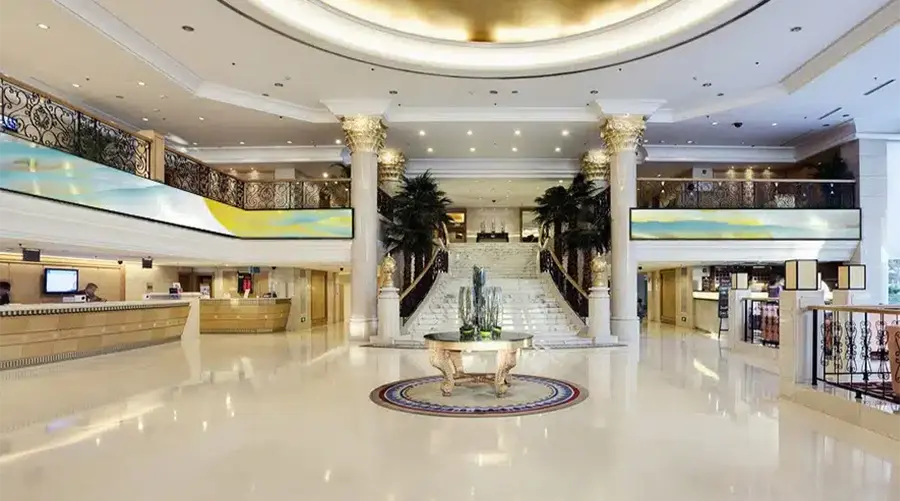
LED displays are redefining how hotels communicate their vision:
Brand Storytelling: Hotels like Bvlgari and Aman use LED screens to showcase their history, craftsmanship, and local culture through cinematic visuals.
Live Streaming Enhancements: Screens enable real-time broadcasting of hotel events (e.g., weddings, galas) to remote audiences, with overlays for sponsor logos or social media feeds.
Interactive Wayfinding: Guests can navigate hotel layouts via touchscreens or AR-guided maps displayed on LED panels, reducing reliance on staff assistance.
Revenue Generation: Promoting on-site amenities (e.g., spas, restaurants) with time-sensitive offers. The Ritz-Carlton in Paris saw a 20% increase in spa bookings after implementing LED-driven promotions.
Environmental Storytelling: LED screens simulate natural or abstract environments (e.g., forests, galaxies) to complement the hotel’s aesthetic. The eco-luxury resort Six Senses uses digital nature scenes to reinforce its sustainability mission.
Real-World Example: At the 2025 Monaco Grand Prix, the Hotel de Paris used AI-generated visuals on LED screens to create a "digital-art-meets-hospitality" experience, where guest movements triggered changes in the displayed artwork.
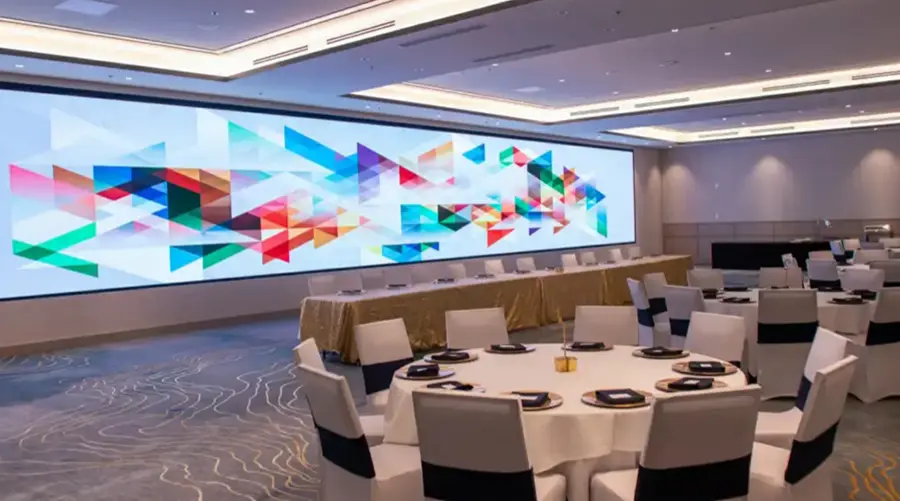
Despite their benefits, LED screens in hotel lobbies face unique challenges:
High Initial Costs: Premium systems can cost $50,000–$200,000+ depending on size and resolution. Solution: Rental models and phased implementation (e.g., starting with smaller kiosks before expanding to full walls).
Heat Management: Continuous operation risks overheating. Solution: Active cooling systems with airflow vents and heat-resistant materials in panel construction.
Content Synchronization: Aligning visuals with hotel operations (e.g., check-in times, event schedules). Solution: Unified control platforms like Extron’s LED processors for centralized management.
Portability vs. Performance: Balancing lightweight design with brightness. Solution: New quantum dot LED chips that maintain 3000 nits brightness while reducing panel weight by 30%.
Power Consumption in Remote Areas: Off-grid locations require backup solutions. Solution: Hybrid solar-diesel generators paired with energy-efficient LED panels.
Companies like Samsung have developed LED systems with built-in diagnostics, automatically adjusting brightness and color balance to compensate for ambient lighting changes during the day. This ensures consistent quality in both indoor and outdoor settings.
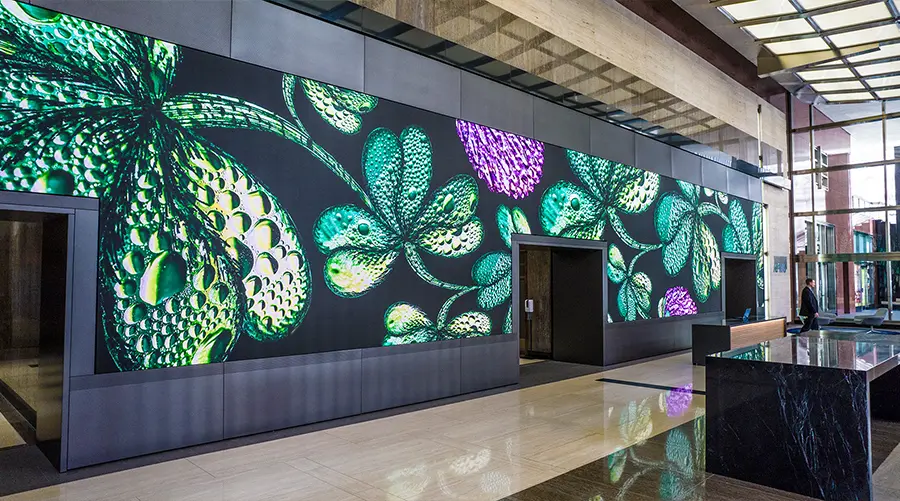
The evolution of LED screens in hospitality is accelerating with these emerging trends:
AI-Driven Content Creation: Machine learning algorithms will generate real-time visuals based on guest preferences or event themes. For example, an AI could adapt a lobby’s background to reflect the mood of a wedding versus a business conference.
Holographic LED Projections: Combining LED screens with volumetric projection to create 3D digital concierges or virtual art installations, as tested by the Henn-na Hotel in Japan.
Biodegradable LED Materials: Eco-conscious manufacturers are testing organic LED substrates that decompose after use, addressing sustainability concerns in the hospitality industry.
Wearable Integration: Flexible LED panels embedded in uniforms or guest accessories for personalized lighting experiences. The Nobu Hotel in Las Vegas experimented with LED-embedded robes that changed colors based on room temperature.
Blockchain-Enabled Content Security: Using blockchain to authenticate digital content and prevent unauthorized duplication of proprietary visuals used in exclusive hotel branding campaigns.
In 2025, the Marina Bay Sands in Singapore unveiled a prototype of a "smart lobby" where LED screens embedded in the floor responded to guest footsteps with light patterns, creating an interactive art experience. Developed by a collaboration between LG and the Singapore Tourism Board, this technology represents the next frontier of hotel design.
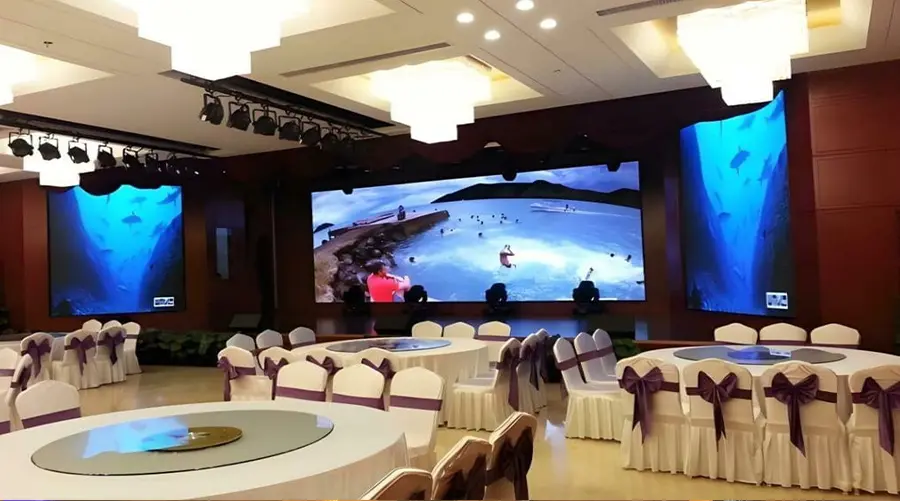
Hotel lobby LED display screens have become a defining feature of modern luxury hospitality. From cinematic storytelling to interactive guest services, this technology empowers hotels to differentiate themselves in a crowded market while enhancing operational efficiency. As innovations like AI-driven content, holography, and sustainable materials mature, LED screens will continue to shape the future of hotel design.
For hotels aiming to elevate their brand and guest experience, investing in LED display technology offers a powerful way to align with evolving consumer expectations. Whether you’re designing a high-end resort or optimizing a boutique hotel’s lobby, LED screens provide the flexibility, impact, and sustainability needed to stand out in 2025 and beyond.
Contact us to discuss customized hotel lobby LED display solutions tailored to your brand’s vision and budget.
Hot Recommendations
Hot Products
Get a Free Quote Instantly!
Talk to Our Sales Team Now.
If you are interested in our products, please contact us promptly
Reach out to our sales team to explore customized solutions that perfectly meet your business needs and address any questions you may have.
Email Address:info@reissopto.comFactory Address:Building 6, Huike Flat Panel Display Industrial Park, No. 1, Gongye 2nd Road, Shiyan Shilong Community, Bao'an District, Shenzhen city , China
whatsapp:+8615217757270